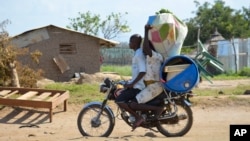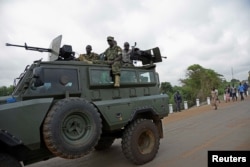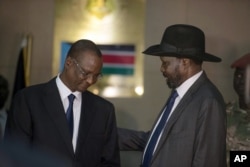The U.N. refugee agency reports more South Sudanese refugees have fled into Uganda in the past three weeks than in the first six months of this year.
The UNHCR says more than 37,000 people have crossed the border since fighting between South Sudan’s rival factions erupted July 8 in the capital, Juba.
The violence that killed at least 300 people has subsided, but tensions are still running high in the capital and other parts of South Sudan.
The U.N. refugee agency says people have little confidence that the situation soon will improve, as evidenced by the upsurge in people fleeing the country.
UNHCR spokesman Adrian Edwards reports daily arrivals into Uganda were averaging around 1,500 ten days ago, but have risen to over 4,000 in the past week. He says the majority of arrivals are women and children.
“The new arrivals are reporting ongoing fighting, looting by armed militias, burning down of homes, murders of civilians," said Edwards. "Some of the women and children told us they were separated from their husbands and fathers by armed groups, who were reportedly trying to recruit them into their ranks and preventing them from crossing the border to leave the country.”
The political situation took a new turn in recent days, as President Salva Kir replaced former rebel leader Riek Machar as vice president with Taban Deng Gai, who helped negotiate last year’s peace deal between the government and opposition.
Observers say this is a sign of serious divisions on the opposition side.
Edwards says he cannot comment on how these developments will impact the situation, but he tells VOA the UNHCR is profoundly worried about how to care for the newest refugees.
“This one is an extremely worrying one, given the limited capacities that there are," he said.
Edwards says the UNHCR is straining to provide shelter and anything beyond basic life-saving assistance to the refugees. He says temporary shelters are being constructed to accommodate new arrivals, while more permanent solutions can be worked out.







